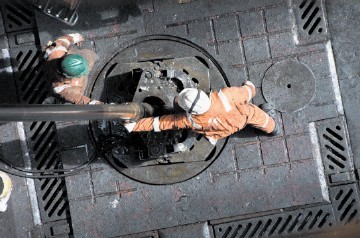
The UK has won its battle to stop Brussels seizing control of the safety regime in the North Sea.
But the European Commission will still force a raft of new regulations on the oil and gas industry later this year.
The EC wanted to introduce continent-wide rules for the offshore sector following the Deepwater Horizon disaster in the Gulf of Mexico in 2010.
It said the huge gas leak on Total’s Elgin platform underlined their case for one health and safety body for the whole of Europe. But last night – following a campaign by British MEPs – Energy Commissioner Gunther Oettinger confirmed that Britain could keep its existing set-up, led by the Health and Safety Executive.
Britain was among those who campaigned for the law to be a directive, meaning each member state is left to transcribe it into its own domestic legislation, rather than an EU regulation which would automatically apply across the 27 members, once approved.
British Conservative members of the European Parliament said they had headed off EU proposals which could have lowered standards in the North Sea.
“Instead of levelling safety standards down, we will be encouraging the rest of Europe to match Britain’s high standards,” said Tory Vicky Ford.
The legislation covers the criteria for awarding operating licences and penalties for breaching safety standards, which could lead to loss of licence.
Companies will also have to carry out emergency planning and risk assessment and will be fully liable for any environmental damage up to 200 nautical miles from the coast.
Although the new rules will only apply to EU waters, the EC says it will work with international partners to promote such standards across the world. Mr Oettinger said: “I welcome this major step to enhancing the safety of offshore oil and gas production in the EU.
“These rules will make sure that the highest safety standards, already mostly in place in some member states, will be followed at every oil and gas platform across Europe.”
Some environmental campaigners said the law, which still needs final endorsement from member states and the European Parliament, was not robust enough.
Others argued it could help to protect Arctic waters from oil spills.
Oil and Gas UK’s health, safety and employment director Robert Paterson said: “The commission’s decision today to establish a directive on offshore safety is the best way to achieve the objective of raising standards across the EU to the high levels already present in the North Sea.”